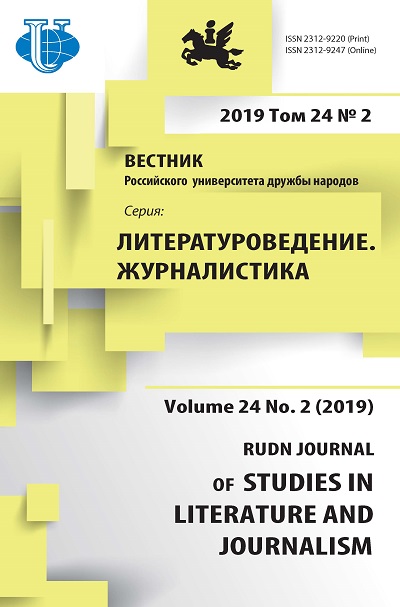Еvent-среда как коммуникативная площадка для современного поэта
- Авторы: Данилова С.А.1, Бильченко Е.В.2
-
Учреждения:
- Санкт-Петербургский государственный университет
- Национальный педагогический университет имени М.П. Драгоманова
- Выпуск: Том 24, № 2 (2019)
- Страницы: 213-222
- Раздел: Литературоведение
- URL: https://journals.rudn.ru/literary-criticism/article/view/21730
- DOI: https://doi.org/10.22363/2312-9220-2019-24-2-213-222
- ID: 21730
Цитировать
Полный текст
Аннотация
Авторы статьи исходят из убеждения в необходимости презентации творческих достижений современного поэта на разнообразных коммуникативных площадках. Рассматриваются и характеризуются различные типы таких площадок, мотивируется необходимость их конвергентного использования в системе стратегических коммуникаций. Эффективность наиболее востребованных коммуникативных площадок выявляется с опорой на оценки поэтов-миллениалов, перед которыми стоит сложнейшая задача выявления собственной авторской идентичности в условиях альтермодерного дискурса. Выделены следующие типы коммуникативных площадок: телешоу, толстый литературный журнал, фестиваль-праздник, фестиваль с конкурсной составляющей, школа писательского мастерства, поэтическая блогосфера и личный бренд. Данные площадки при сочетании предлагаемых ими коммуникативных возможностей позволяют интегрировать традиции и новации, модерн и постмодерн, универсальное и партикулярное, массовое и элитарное начала в культуре, преодолевая отрицательные тенденции каждого дискурса в отдельности: изоляционизм и коммерциализацию, догматизм и симуляцию, закрытость для собеседника и девальвацию ценностей высокой поэтической культуры. В исследовании выдвигается гипотеза о том, что поэт-миллениал выбирает искусство совмещать как наиболее эффективную коммуникативную стратегию, позволяющую автору проявить свою идентичность.
Ключевые слова
Об авторах
Стефания Антоновна Данилова
Санкт-Петербургский государственный университет
Автор, ответственный за переписку.
Email: ichwerdewarten@gmail.com
магистр филологии, аспирант Высшей школы журналистики Санкт-Петербургского государственного университета
Российская Федерация, 199034, Санкт-Петербург, Университетская набережная, 7-9Евгения Витальевна Бильченко
Национальный педагогический университет имени М.П. Драгоманова
Email: yevzhik80@gmail.com
профессор кафедры культурологии факультета философского образования и науки Национального педагогического университета имени М.П. Драгоманова, доктор культурологии
Украина, 01601, Киев, ул. Пирогова, 9Список литературы
- Арендт Х. Vita Activa, или О деятельной жизни / пер. с нем. и англ. В.В. Бибихина. СПб.: Алетейя, 2000. 437 с.
- Бадью А. Манифест философии / сост. и пер. с франц. В.Е. Лапицкого. СПб.: Machina, 2003. 184 с.
- Брэйссер Р. Презентация как анти-феномен в «Бытии и событии» Алена Бадью // Хора. 2008. № 1. С. 63-80.
- Быков И.А. Технология брендинга. СПб.: Изд-во СПбГУ, 2009. 70 с.
- Гадамер Г.-Г. Актуальность прекрасного. М.: Искусство, 1991. С. 266-323.
- Грякалов А.А. Философия события и герменевтика памяти: свидетельства утверждения // Slavica TerGestina. 2017. № 18. С. 31-57.
- Долгополов Л.К. На рубеже веков. О русской литературе конца XIX - начала ХХ веков. Л.: Советский писатель, Ленинградское отд-е, 1977. 352 с.
- Исупов К.Г. Имя // Terra Humana. 2016. № 1 (8). С. 191. URL: http://www.terrahumana.ru/ arhiv/08_01/08_01_16.pdf
- Каверина Е.А. Событийные коммуникации в координатах современности // Международный журнал исследований культуры. 2017. № 2 (27). С. 55-64.
- Каверина Е.А. Создание событий: гуманитарные технологии в корпоративных коммуникациях: научно-практические материалы. СПб.: Книжный Дом, 2008. 168 с.
- Капица Ф.С., Колядич Т.М. Русская проза XXI века в критике. Рефлексия, оценки, методика описания. СПб.: Флинта, 2011. 430 с.
- Кожевников Н.Н., Пашкевич Н.Л. Глокализация: концепции, характерные черты, практические аспекты // Вестник ЯГУ. 2005. Т. 2. № 3. С. 111-115.
- Кузьминова Ю.В., Болотова И.С. Выставочные мероприятия в формате коммуникативной площадки как качественное и многофункциональное средство продвижения товара // Вестник Белгородского университета кооперации, экономики и права. 2016. № 5 (61). С. 255-265.
- Мандельштам О. Воспоминания. Шум времени. М.: АСТ, 2015. 288 c.
- Петрова С.А. Авторская идентичность и понятие имиджа в литературе: теоретический аспект. URL: https://cyberleninka.ru/article/v/avtorskaya-identichnost-i-ponyatie-imidzhav-literature-teoreticheskiy-aspekt
- Хайдеггер М. Время и бытие: статьи и выступления / сост., пер. с нем., вступ. ст., примеч., тематич. указ. и указ. имен В.В. Бибихина. М.: Республика, 1993. С. 391-406.
- Bourriaud N. The Radicant // Tate Britain, 3 februari - 26 april. Sternberg Press, 2009. URL: www.metropolism.org/magazine/2009-no1/een-archipel-van-lokale-reacties/
- Cambridge Dictionary Online: Free English Dictionary and Thesaurus. URL: http://dictionary. cambridge.org
- Diamond L. A Fourth Wave or False Start? Democracy After the Arab Spring // Foreign Affairs. May 22, 2011. 345 p.
Дополнительные файлы















